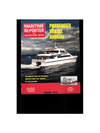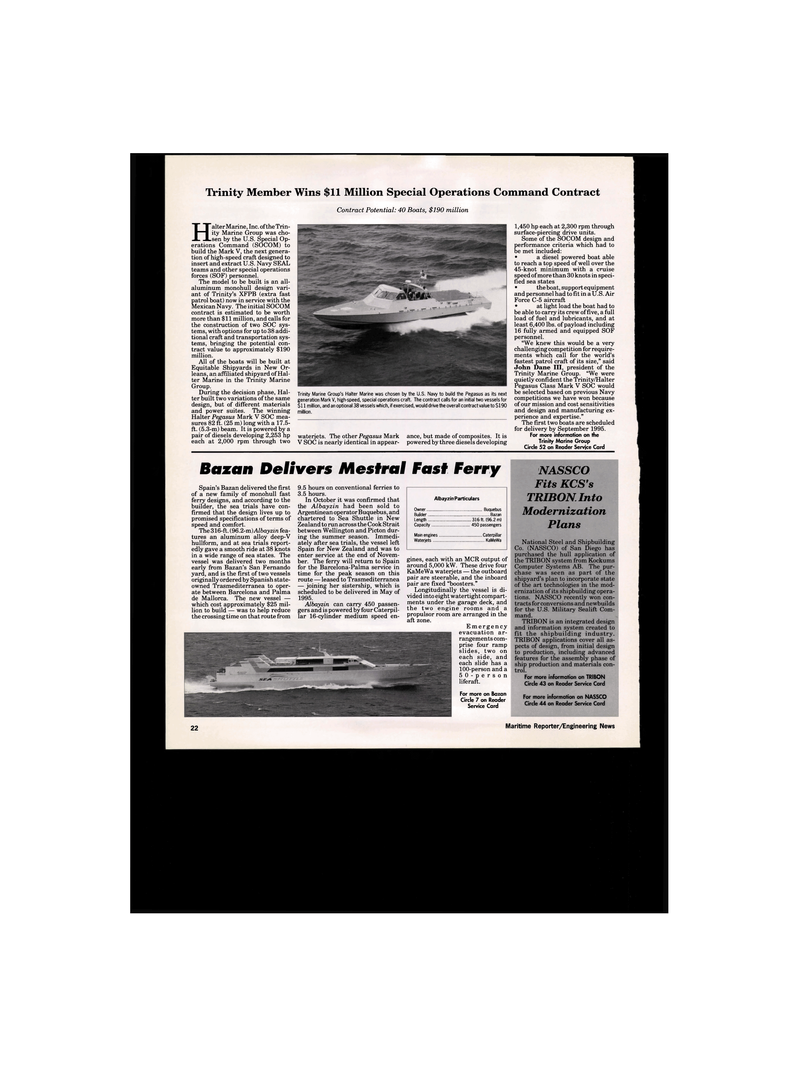
Page 20: of Maritime Reporter Magazine (January 1995)
Read this page in Pdf, Flash or Html5 edition of January 1995 Maritime Reporter Magazine
Trinity Member Wins $11 Million Special Operations Command Contract
Contract Potential: 40 Boats, $190 million
Trinity Marine Group's Halter Marine was chosen by the U.S. Navy to build the Pegasus as its next generation Mark V, high-speed, special operations craft. The contract calls for an initial two vessels for $11 million, and an optional 38 vessels which, if exercised, would drive the overall contract value to $190 million.
Halter Marine, Inc. of the Trin-ity Marine Group was cho-sen by the U.S. Special Op- erations Command (SOCOM) to build the Mark V, the next genera- tion of high-speed craft designed to insert and extract U.S. Navy SEAL teams and other special operations forces (SOF) personnel.
The model to be built is an all- aluminum monohull design vari- ant of Trinity's XFPB (extra fast patrol boat) now in service with the
Mexican Navy. The initial SOCOM contract is estimated to be worth more than $11 million, and calls for the construction of two SOC sys- tems, with options for up to 38 addi- tional craft and transportation sys- tems, bringing the potential con- tract value to approximately $190 million.
All of the boats will be built at
Equitable Shipyards in New Or- leans, an affiliated shipyard of Hal- ter Marine in the Trinity Marine
Group.
During the decision phase, Hal- ter built two variations of the same design, but of different materials and power suites. The winning
Halter Pegasus Mark V SOC mea- sures 82 ft. (25 m) long with a 17.5- ft. (5.3-m) beam. It is powered by a pair of diesels developing 2,253 hp each at 2,000 rpm through two waterjets. The other Pegasus Mark V SOC is nearly identical in appear- ance, but made of composites. It is powered by three diesels developing 1,450 hp each at 2,300 rpm through surface-piercing drive units.
Some of the SOCOM design and performance criteria which had to be met included: • a diesel powered boat able to reach a top speed of well over the 45-knot minimum with a cruise speed of more than 30 knots in speci- fied sea states • the boat, support equipment and personnel had to fit in a U.S. Air
Force C-5 aircraft • at light load the boat had to be able to carry its crew of five, a full load of fuel and lubricants, and at least 6,400 lbs. of payload including 16 fully armed and equipped SOF personnel. "We knew this would be a very challenging competition for require- ments which call for the world's fastest patrol craft of its size," said
John Dane III, president of the
Trinity Marine Group. "We were quietly confident the Trinity/Halter
Pegasus Class Mark V SOC would be selected based on previous Navy competitions we have won because of our mission and cost sensitivities and design and manufacturing ex- perience and expertise."
The first two boats are scheduled for delivery by September 1995.
For more information on the
Trinity Marine Group
Circle 52 on Reader Service Card
Albayzin Particulars
Owner Buquebus
Builder Bazan
Length 316 ft. (96.2 m)
Capacity 450 passengers
Main engines Caterpillar
Waterjets KaMeWa
NASSCO
Fits KCS's
TRIBON Into
Modernization
Plans
National Steel and Shipbuilding
Co. (NASSCO) of San Diego has purchased the hull application of the TRIBON system from Kockums
Computer Systems AB. The pur- chase was seen as part of the shipyard's plan to incorporate state of the art technologies in the mod- ernization of its shipbuilding opera- tions. NASSCO recently won con- tracts for conversions and newbuilds for the U.S. Military Sealift Com- mand.
TRIBON is an integrated design and information system created to fit the shipbuilding industry.
TRIBON applications cover all as- pects of design, from initial design to production, including advanced features for the assembly phase of ship production and materials con- trol.
For more information on TRIBON
Circle 43 on Reader Service Card •
For more information on NASSCO
Circle 44 on Reader Service Card
Bazan Delivers Mestral Fast Ferry
Spain's Bazan delivered the first of a new family of monohull fast ferry designs, and according to the builder, the sea trials have con- firmed that the design lives up to promised specifications of terms of speed and comfort.
The 316-ft.(96.2-m)AZ6ayzm fea- tures an aluminum alloy deep-V hullform, and at sea trials report- edly gave a smooth ride at 38 knots in a wide range of sea states. The vessel was delivered two months early from Bazan's San Fernando yard, and is the first of two vessels originally ordered by Spanish state- owned Trasmediterranea to oper- ate between Barcelona and Palma de Mallorca. The new vessel — which cost approximately $25 mil- lion to build — was to help reduce the crossing time on that route from 9.5 hours on conventional ferries to 3.5 hours.
In October it was confirmed that the Albayzin had been sold to
Argentinean operator Buquebus, and chartered to Sea Shuttle in New
Zealand to run across the Cook Strait between Wellington and Picton dur- ing the summer season. Immedi- ately after sea trials, the vessel left
Spain for New Zealand and was to enter service at the end of Novem- ber. The ferry will return to Spain for the Barcelona-Palma service in time for the peak season on this route — leased to Trasmediterranea — joining her sistership, which is scheduled to be delivered in May of 1995.
Albayzin can carry 450 passen- gers and is powered by four Caterpil- lar 16-cylinder medium speed en- gines, each with an MCR output of around 5,000 kW. These drive four
KaMeWa waterjets — the outboard pair are steerable, and the inboard pair are fixed "boosters."
Longitudinally the vessel is di- vided into eight watertight compart- ments under the garage deck, and the two engine rooms and a propulsor room are arranged in the aft zone.
Emergency evacuation ar- rangements com- prise four ramp slides, two on each side, and each slide has a 100-person and a 50-person liferaft.
For more on Bazan
Circle 7 on Reader
Service Card 22 Maritime Reporter/Engineering News

 19
19

 21
21
